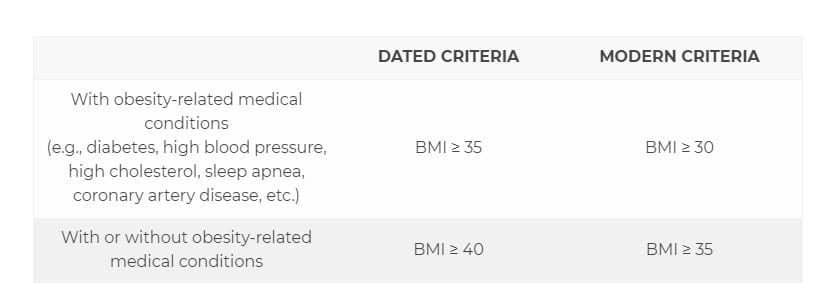
What To Know Before Undergoing Gastric Sleeve Surgery
If you’re considering weight loss surgery, you’ve likely heard of the Gastric Sleeve procedure, also known as a Vertical Sleeve Gastrectomy (VSG). It is one of the most popular weight-loss operations worldwide and can not only provide effective and long-term weight loss, but also relieve other medical conditions, such as diabetes or high blood pressure. Making the decision to undergo weight loss surgery takes time and involves careful research. We’ve compiled an intuitive guide to help provide you with a better understanding of what Gastric Sleeve surgery involves, so you can be well-equipped on making your decision.
Table of Contents:
Last Updated on November 22, 2023
Qualifying For Gastric Sleeve Surgery
What is a Gastric Sleeve?
Before we look at qualifying factors for a Gastric Sleeve, let’s talk about what this weight loss surgery actually entails. Gastric sleeve surgery is a bariatric procedure that involves removing the stretchy portion of your stomach. This procedure helps you lose weight in three main ways:
You Eat a Smaller Amount of Food – Gastric sleeve surgery reduces the size of your stomach by about 80%. Following the surgery, patients tend to feel full after eating only a small amount of food and you’ll keep the feeling of fullness for longer than you did before the surgery. Smaller portion sizes mean you’ll consume fewer calories of food.
It Reduces Your Appetite – In addition to reducing its size, the portion of the stomach removed in a gastric sleeve includes most of the section of the stomach responsible for producing ghrelin; the hormone that stimulates your appetite by sending hunger signals to the brain. Lower ghrelin production means fewer hunger signals and a reduction in your desire to eat, which also reduces your overall calorie intake.
It Reduces Your Cravings – The hormone changes that result from Gastric Sleeve Surgery also tend to dramatically reduce a patient’s craving for “trigger foods” such as sweets and carbs.
Gastric Sleeve Qualifications
There is a general misconception about weight loss surgery, with many thinking that you must be extremely obese to qualify. This could not be further from the truth. In fact, the overwhelming majority of our patients at The Sleeve Clinic, are nowhere near that weight-class. One of the main qualifications you can use to determine whether you are eligible for gastric sleeve surgery, is calculating your Body Mass Index, also known as BMI.
Below are the criteria developed by the National Institute of Health (NIH) to determine whether an individual is eligible for weight loss surgery:
- BMI ≥ 35 with obesity-related medical conditions (e.g., diabetes, high blood pressure, high cholesterol, sleep apnea, coronary artery disease, etc.)
- BMI ≥40 with or without obesity-related medical conditions
It is important to note that the above criteria were put into place almost 30 years ago. While the criteria still stands today, a large amount of research has emerged showing that many more patients than those who currently qualify, would still benefit from bariatric surgery.
Considering the many health benefits of bariatric surgery as well as its safe and minimally invasive nature, many leading professional organizations now recommend that weight loss surgery be offered to patients with a lower BMI:

To easily calculate your BMI, use our weight loss calculator here.
Qualifying is the first step to becoming a candidate for a bariatric procedure, but that may not mean that surgery is right for you. To determine whether you are a good candidate for gastric sleeve surgery, you will need to talk to a bariatric surgeon.
Finding The Right Bariatric Surgeon

When it comes to your weight loss surgery, there are no shortcuts. Choosing the right bariatric surgeon is perhaps the single most important decision you will make when pursuing gastric sleeve surgery. Not only will a skilled bariatric surgeon perform the operation, but they’ll guide you through your weight loss journey for years afterwards. They will provide you with tools that are necessary to thrive after your operation and ensure that you never return to your former unhealthy self.
How To Find A Gastric Sleeve Surgeon
Not all weight loss surgeons and Bariatric Centres are created equal. Who you ultimately choose as your bariatric surgeon will likely have a significant impact on your success.
When picking a surgeon, there are two main areas to focus on:
- Choosing a surgeon with the experience and skills necessary to safely construct a perfect sleeve
- A clinic that has an excellent Aftercare Program
With a little digging and the right questions, you can dramatically increase the odds of finding an outstanding surgeon and Bariatric Centre to help guide you on your weight loss surgery journey.
Bariatric Surgeon Criteria
- Associated with an established Bariatric Centre of Excellence
-
- A Bariatric Centre of Excellence is a designation that a Bariatric Program receives indicating that a thorough review has been performed and that the Centre is operating at the highest standards of the field. What does this mean? It means that the surgeons are well trained and qualified, that the Program meets specific requirements and criteria.
- In Ontario, there are a handful of government designated BCOEs
- Has completed fellowship training in bariatric surgery
- Impeccable reputation
- Make sure they are experienced in all of the bariatric surgery procedures – not just the operation you are having.
- Gastric bypass, sleeve, duodenal switch, revisional surgery
- Performed at the minimum 500 advanced bariatric procedures or more (sleeves and bypasses).
- At least 5 years of surgical experience or more
- Make sure that your surgeon knows and follows each and every patient personally and has great bedside manner
Provides a thorough After-Care Program with frequent mandatory check-ins, nutrition counselling, and virtual visits to ensure you stay-on-track throughout the program and beyond
What Is The Cost Of Gastric Sleeve Surgery?

Is The Gastric Sleeve Covered by OHIP?
For residents of Ontario, the Gastric Sleeve is only covered by OHIP (Ontario Healthcare Insurance Plan) in a few, very specific circumstances. The MOHLTC, (Ontario Ministry of Health and Long Term Care), does cover a different procedure, called: “gastric bypass” in patients with:
- a BMI >40 or BMI>35 with obesity-related health conditions
The MOHLTC will only cover a gastric sleeve if:
- There is severe scar tissue from a previous surgery that prevents surgeons from performing a gastric bypass
- The patient has a BMI>60 and/or
- The patient has certain pre-existing medical conditions that make a gastric bypass excessively risky (e.g., ulcerative colitis, chronic steroid use, etc.)
Financing Options
There are financing options available that offer no down payments with easy monthly instalments. At The Sleeve Clinic, we have partnered with one of Canada’s most esteemed financing companies – Medicard – to offer an easy and convenient financing option.
Gastric sleeve surgery is ultimately an investment in yourself. After all, what’s worth more than your health?
Is The Gastric Sleeve Reversible?
The gastric sleeve is a minimally invasive procedure that involves stapling the stomach lengthwise and removing a portion through a small skin incision. Once removed, the specimen is placed into a preservative solution and sent to the pathology lab to be examined days later under the microscope.
Due to the nature of the surgery, reversing a gastric sleeve is simply not possible. While the gastric sleeve cannot be reversed, it can be converted into a different procedure if necessary, such as a gastric bypass or duodenal switch.
Why Would You Need To Reverse A Gastric Sleeve?
There are two scenarios that would lead a bariatric surgeon to recommend converting the gastric sleeve to a different weight loss procedure:
- Unrelenting heartburn. A small number of patients may develop unrelenting heartburn after gastric sleeve surgery that fails to respond to powerful antacid medication. This is most typically seen in patients with a history of severe daily heartburn before they even had the gastric sleeve procedure. In this small fraction of patients, when all other options have been exhausted, we will sometimes recommend converting the gastric sleeve to a gastric bypass procedure which tends to improve heartburn symptoms.
- Insufficient weight loss. In patients that have lost an insufficient amount of weight following gastric sleeve surgery, the option exists to perform a “second stage” procedure such as the duodenal switch, which provides additional weight loss. This is most commonly seen in patients who present with a very high BMI prior to sleeve gastrectomy (e.g., BMI>55-60).
How Long Does A Gastric Sleeve Operation Take?

One of the reasons that the gastric sleeve procedure has become the most popular option for weight-loss surgery is the relative simplicity of performing the procedure compared to many other forms of bariatric surgery, such as gastric bypass surgery. The Gastric Sleeve is performed using a minimally invasive, laparoscopic technique. The entire procedure generally takes less than 30 minutes of actual surgery time to perform.
The Weight Loss Procedure
The gastric sleeve procedure is performed using general anesthesia so that patients are completely asleep during the entire procedure. Once under anesthesia, a few small incisions are made in your abdomen to allow for a camera and surgical instruments. Using a specialized surgical stapler that seals and cuts your stomach, this procedure removes the stretchy portion of your stomach to reduce your stomach size by about 80%.
After the surgery:
- You will feel full and satisfied after eating less
- Appetite and cravings are substantially diminished due to fewer hunger-causing hormones
- Dramatic improvement or complete resolution of most weight-related medical conditions
What Is The Recovery Time After Gastric Sleeve Surgery?

Due to its minimally invasive nature using laparoscopic surgical techniques which lessens the stress on your body, the recovery time after a gastric sleeve surgery is relatively quick. The actual surgery portion generally takes less than 30 minutes. Patients are monitored post-surgery and typically discharged within 24 hours. Most patients are back to their “normal selves” in about a week or less (similar to gallbladder surgery). However, if possible, we suggest patients take about two weeks off from work to focus on adjusting to their new stomach and lifestyle.
While the recovery time for gastric sleeve surgery is quick, the journey to permanent weight loss is ongoing. It is important to follow the individualized aftercare program outlined by your bariatric surgeon so that you can ensure long term success with your new stomach!
Are you ready to take the first step? Contact us for a complimentary, no-pressure consultation to see if weight loss surgery is right for you.






